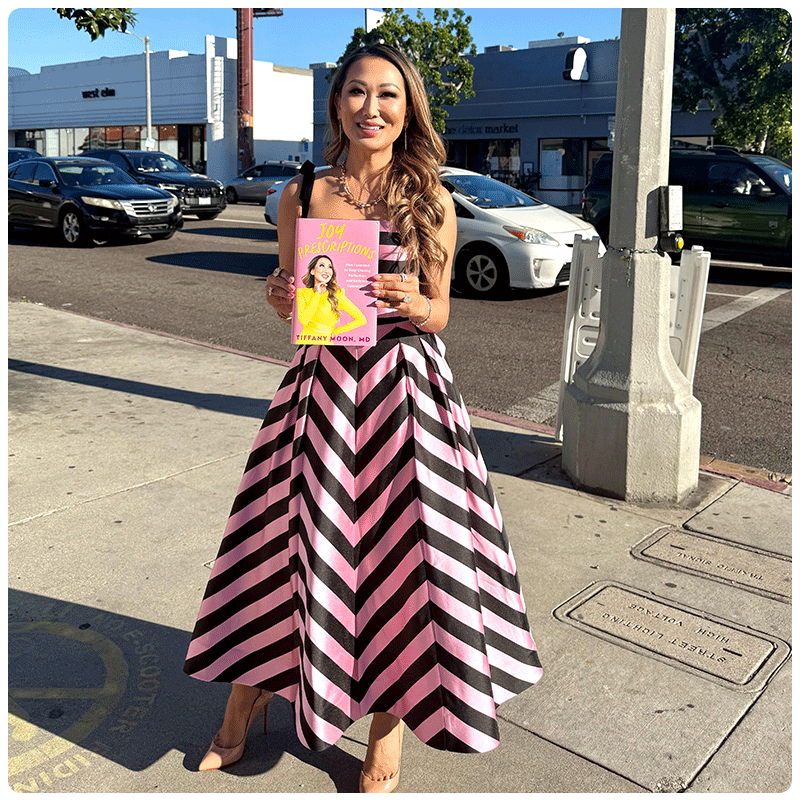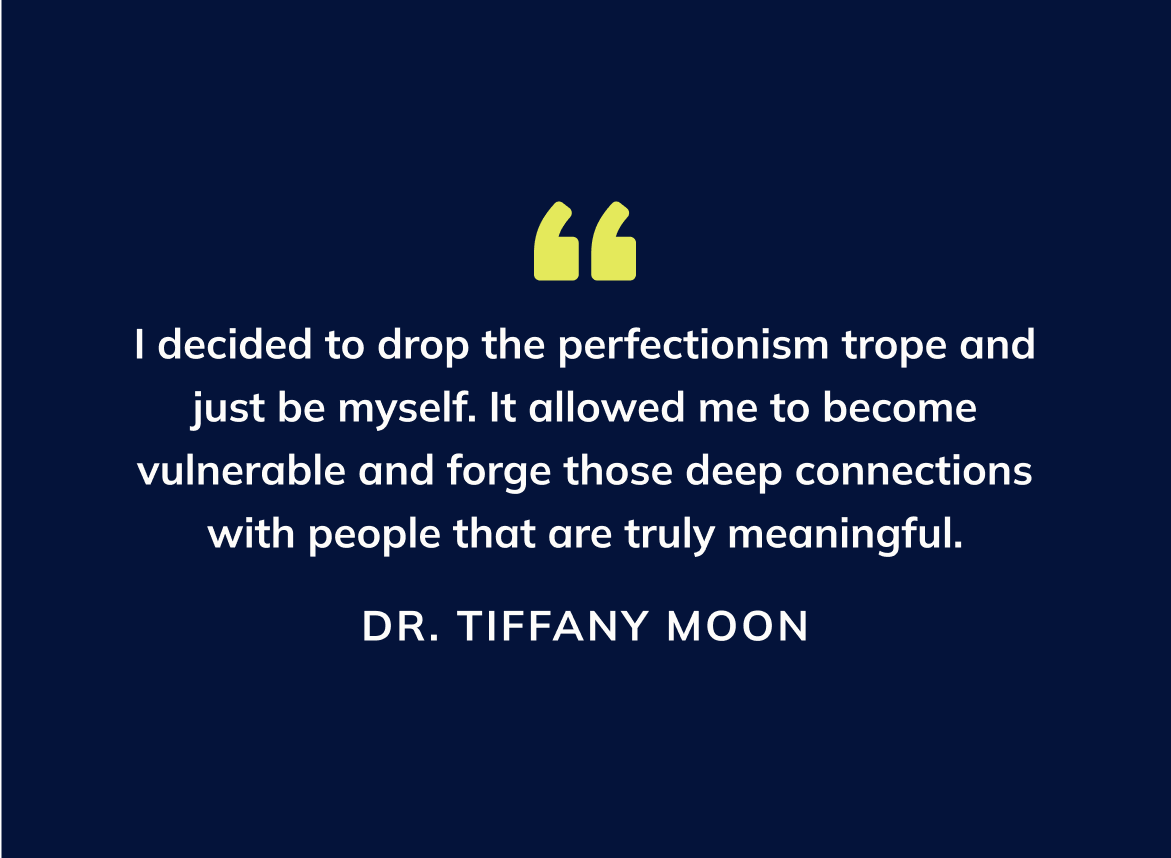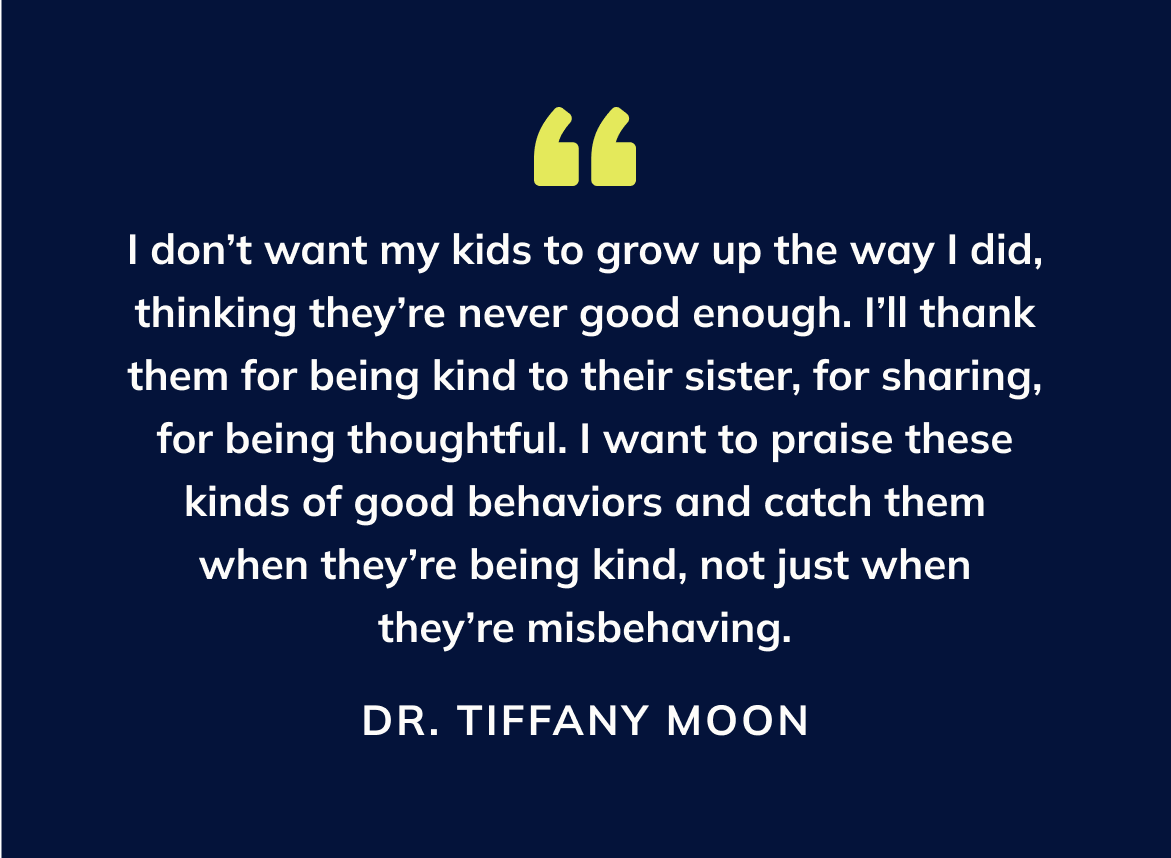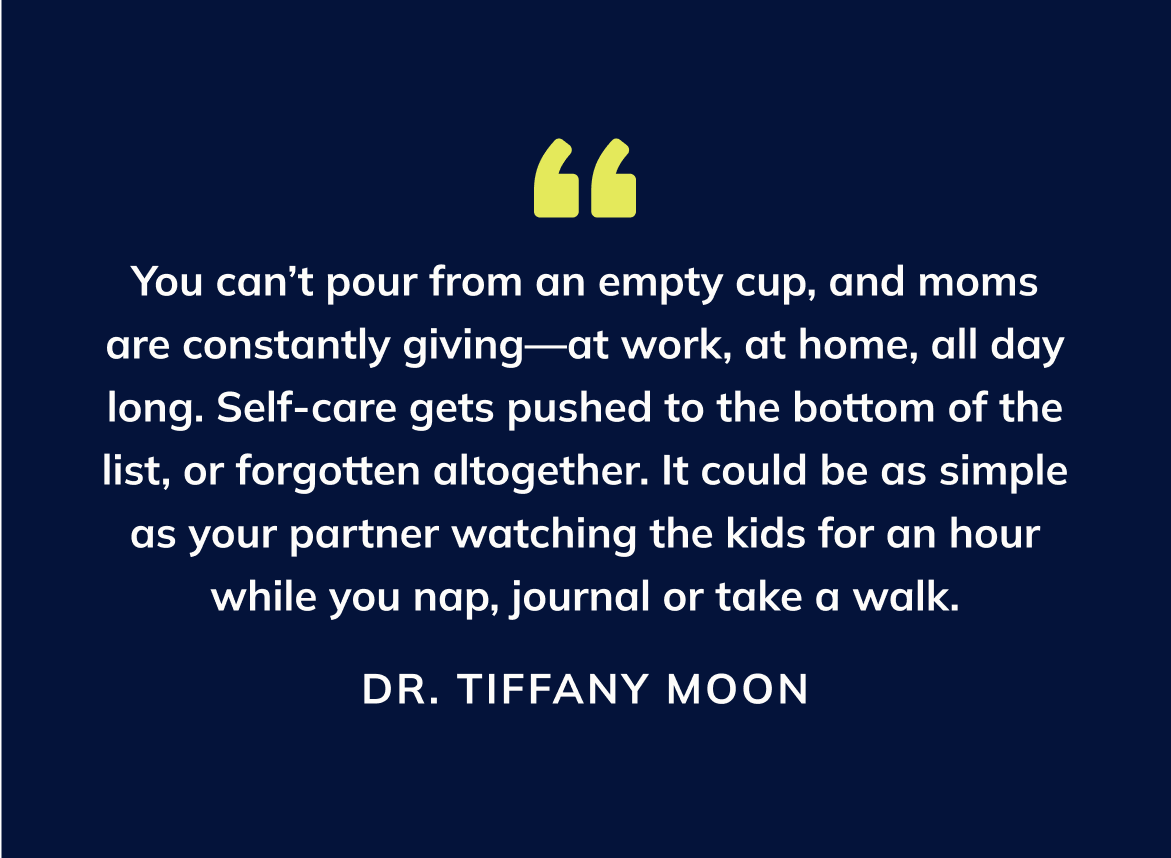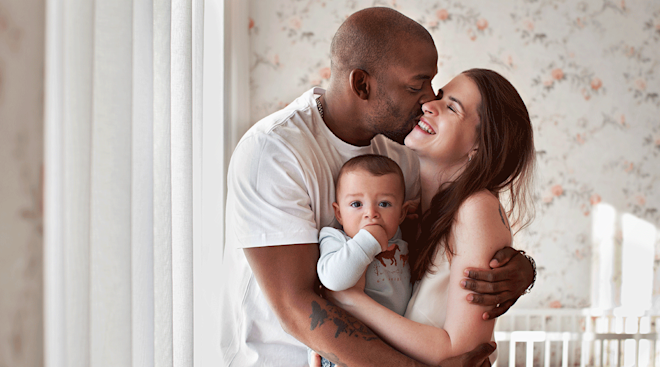Real Housewives’ Tiffany Moon on Trading Parenting Perfection for Connection
Tiffany Moon, MD, spent years playing the part of the perfect mom—flawless outfits, packed calendar and a smile that said, “I’ve got this.” As a first-generation Asian-American whose parents prioritized achievement, on paper, Moon was thriving as a double board-certified anesthesiologist, successful entrepreneur, Real Housewives of Dallas personality and mom of four. But behind the scenes, she was exhausted, lonely and lost. She felt like she was failing.
Now, she’s pulling back the curtain. In her new book Joy Prescriptions, Moon shares how she finally hit an all-too-familiar wall with burnout, stepped away from perfection and rediscovered who she was beyond all the ‘hats’ she wore. In an exclusive conversation with The Bump, the motivational speaker reveals why embracing imperfection may be the greatest gift you can give your kids.
The Bump: In Joy Prescriptions, you talk about “trading perfection for connection.” How has this made a difference in your life?
Tiffany Moon: When my twins were young, I wanted to seem like I was this perfect mom and had it all together. I was working full-time as an academic anesthesiologist, and I’d always make sure the girls were perfectly dressed in coordinating or matching outfits, and we’d go out, and it was just so lonely and exhausting. I missed out on a lot of moments of potential connection because I had to maintain this facade of being perfect.
When I decided to drop the perfectionism trope and just be myself, it allowed me to become vulnerable and forge those deep connections with people that are truly meaningful. I talked to the other moms… We’d give each other survival tips, parenting tips, babysitter recommendations—things like that. But when I stopped trying to be so perfect, it actually allowed me to have conversations with people where they genuinely tried to help me with my problems.
TB: Was this shift from perfection to connection gradual? Or was there a breaking point when you knew things had to change?
TM: It was definitely gradual. It’s not like one day I just decided that I was fed up and going to let all my walls down. I think it was some combination of being exhausted, overstimulated, lonely and feeling like I didn’t have a community of close mom friends who understood me. A lot of my friends didn’t go back to work when they had children. And so in some ways, I felt guilty that I chose to go back to work when, in fact, I didn’t have to. I could have just stayed home with my twins, but I wanted to go back to work. I did a lot of school and training to become an anesthesiologist, and I didn’t want to not do that anymore. So there was some guilt.
It’s like when I was at work, I felt guilty about not being home with the girls. And then whenever I was home with the girls and taking some time off work, I felt bad that my work was piling up. It’s like I always felt like, at the end of every day, I was letting someone down.
TB: What do you feel is key to remember when you’re struggling with mom guilt?
TM: I think what we can all do is just give a little bit of grace to women who are literally trying to do it all. We work a 9 to 5—or, for me, sometimes it’s a 7 to 5—and then we come home and do the second shift from 5 to 9: get dinner on the table, get the kids fed, bathed, all that stuff. And it’s a lot. I feel like there are more demands on the modern working mom than ever before. So it’s really important to give yourself grace.
TB: Burnout advice often boils down to “just do less,” which can feel impossible for high achievers or those struggling with people pleasing or perfectionism. How did you learn to give your best while shifting your energy toward what truly matters?
TM: It can be so frustrating when people give vague advice like “say no more often” or “do less.” I’m like, “which less do you want me to do? Being a doctor? Feeding my children? Keeping the house clean? What part should I do less of? Please tell me.” I always like more specific, actionable advice. In this case, I think it’s a two-step thing.
First, identify the root cause of your burnout. Are you just doing too many things? Do you feel overextended? Or is your burnout stemming from the fact that you don’t feel like your work is valued? Or you don’t like the people you work with? Or maybe you’re in the wrong job?… I feel like we throw that word around a lot, but what is it that’s causing you to be burned out?
For me, it was a sense that I was giving the best parts of myself to people outside my home who I thought cared about me a lot. And then, when I needed a small, simple favor, it became very apparent to me that they didn’t care about me at all. I listened to this TED Talk that was like, “Your work is not your family.” I wish I had known that earlier because I treated my work like my family. And I just felt like no matter how hard I worked, nobody really cared about me at work. If I dropped dead the next day at work, they’d find someone to fill my position, whereas my family would be forever messed up by it.
Second, realign your time and priorities with what matters most to you and where you find reciprocal energy. Back then, my priorities weren’t aligned with what I really loved. I gave the bulk of my energy, time and effort outside the home. When I realized that kind of energy and love wasn’t being reciprocated, it shook me up… So I went from being full-time—which really was more than full-time, it was 50 to 60 hours—to part-time, which was 40 hours. I just decided to focus more on the people that truly matter to me instead of every day bringing home the tired, cranky, spent version of myself to my family. I just couldn’t do that to them anymore.
TB: Setting boundaries is a big part this. Chrissy Teigen recently spoke out about the pressure growing up, especially as a first-generation Asian-American, to perform and be the “perfect child.” How have you learned to prioritize boundaries over people-pleasing?
TM: I shifting my focus from pleasing others to pleasing myself and my family. People-pleasing stems from the desire to be liked—you’re afraid to say no or not do something because you think you’ll upset someone and they won’t like you anymore. But I think when you reach a certain age or mindset, you realize: if someone doesn’t like me because I didn’t do X, Y, or Z, then maybe I don’t need to be investing my time with that person.
All my friends that I hold near and dear to my heart—I don’t feel the need to people-please around them, because I know they love me for who I am, not what I do. So when I started examining when I felt “icky” about things, it was generally in relation to people I didn’t actually care for that much. So I just slowly stopped people-pleasing.
TB: How do you model this for your daughters?
TM: I used to be one of those moms who had to be at every ballet rehearsal—not just the recitals. But, a while ago, I realized it was just getting to be too much. I’m running three businesses and still working. So I asked my girls, “How would you feel if Mommy didn’t go to some of your practices?” I thought they’d say, “No, we want you there at every single one,” but they were cool about it. They said, “As long as you’re there for the recital, you don’t have to go to every practice.”
And it’s so weird, because in my head, I had made up that my kids would be disappointed in me if I didn’t go to every single thing. But when I finally set a boundary and had an honest conversation, they understood completely. I thought, ‘Why did I suffer so much?’ I was trying to take Zoom calls from the car, drop them off, shuttle them somewhere else—I was driving myself crazy, all because I had this false belief that my kids needed me there 100 percent of the time, when in fact, they don’t.
I think parents should talk to their kids more. I think after the age of 7 or 8, kids are actually pretty intuitive and can communicate what they want and need. I was raised in an environment where my parents never really asked how I was feeling or what I thought about anything. But I’ve learned a lot just by asking my kids how they feel and what they want. By modeling balance and respect for myself, I hope my girls see that setting boundaries isn’t selfish.
TB: Speaking of your parents, you’ve shared that growing up with Asian-American immigrant parents came with a lot of pressure to succeed. How has that shaped your approach to parenting, and what are you doing differently with your own kids?
TM: When I was growing up, if you got a 96 percent, it meant you did something wrong—because you must have missed a question, or else you would’ve scored 100. And I hated that. I always felt like I wasn’t good enough unless I got a perfect score.
So now, when it comes to parenting my children, I focus on praising their effort, sincerity, and creativity more than their actual grades. It’s not, “Wow, you got an A on your math test—I’m so proud of you.” Regardless of the grade, I’ll say, “I saw you studying last night for your math test, and I’m so proud that you’re putting effort into learning this material and doing something with it.”
I don’t want my kids to grow up the way I did, thinking they’re never good enough. I’m constantly telling them they are enough—that I love them. I’ll thank them for being kind to their sister, for sharing, for being thoughtful. I want to praise these kinds of good behaviors and catch them when they’re being kind, not just when they’re misbehaving.
I try to use a lot of positive reinforcement, because when I was growing up, there wasn’t any. I don’t think my parents ever said, “Good job,” or “We’re proud of you,” or “You’re so kind and thoughtful.” That’s just not how I was raised… As a parent, do you ever really know how you’re doing? My kids might end up in therapy, I don’t know. I’m just doing the best I can with the resources that I have.
TB: On tough parenting days when things don’t go the way you hoped or you feel like you’ve fallen short, how do you handle it?
TM: If I’m in a really bad mood or something happened at work and my kids are sort of acting up, I’ll remove myself from the situation. I’ll go meditate or take the dog for a walk and just calm myself down for 20 minutes. I’ve learned to notice when I’m a little overstimulated, snappy or cranky. So I’ll step away. But there have been times when that’s not possible and I’ve snapped at my kids and later realized my reaction was way out of proportion for what they were doing.
I want my children to learn that people make mistakes and that it’s okay to own up to them. The way I was raised, my parents would never come to me and say, “I shouldn’t have yelled at you earlier. I had a bad day.” That just wasn’t the way things were. So I’ll go to my kids and say, “Mommy didn’t mean to raise her voice earlier. Mommy had a really hard day at work and I’m just feeling a little tired. And when you guys were fighting, that upset Mommy. But I want you to know I didn’t mean to take it out on you, and I’m not upset with you.”
Kids are very resilient. They don’t hold grudges like adults do. They might fight with each other, and 10 minutes later, they’re playing again. They get over things quickly. But I’ll admit to my kids when I’ve made a mistake because I want them to learn the skill of being self-aware and knowing that it’s okay to admit fault.
TB: You truly are a multi-hyphenate woman. You’re a doctor, entrepreneur, author, reality star, motivational speaker and mom. In a world that’s eager to define us by titles and what we do, how do you stay rooted in who you are?
TM: Before I started doing all these other things, I was just a doctor. So much of my identity was wrapped up in that role that when I started thinking about going part-time, I felt like I was losing a part of myself. I was winning awards, running clinical trials, publishing papers and speaking at conferences. Going part-time felt like people wouldn’t take me as seriously. I had an identity crisis.
When I began adding all the other “hyphen” titles—reality TV, social media influencer, entrepreneur, motivational speaker, things started opening up for me. I think what allowed me to do that is realizing that my identity isn’t in what I do and what I achieve, but in who I am. Now I say: I’m kind. I’m curious. I’m creative. I love deep, meaningful conversations… And now, even though I wear all these hats, it’s just that, I just wear all these different hats, but at the core of it, it’s just me.
Knowing that takes the pressure off of trying something new. You can try on a new hat, and if it doesn’t fit, take it off. It doesn’t change who you are, and I don’t lose myself. That mindset gives you freedom and flexibility.
TB: For parents in the thick of it, discerning who they are and what brings them joy can be difficult, especially if they’ve spent their lives people-pleasing or living for others. What would you say to those who’ve lost sight of what lights them up? How did you find that joy again?
TM: This hits especially for women. You can’t pour from an empty cup, and moms are constantly giving—at work, at home, all day long. Self-care gets pushed to the bottom of the list, or forgotten altogether. But I always say, prioritize yourself. And that doesn’t mean a luxury spa day. It could be as simple as your partner watching the kids for an hour while you nap, journal or take a walk.
As a mom, I rarely feel alone. I’m with patients at work, then with my kids at home. What I crave is one hour where no one needs me and no one talks to me—and that’s not selfish. It’s necessary. Time by myself sitting with the quiet has always given me the clarity to think about what I want. Intentionally scheduling alone time has allowed me to write my book and plan my women’s leadership summit. Those are the things that light me up. And then I’m happy and joyful and fulfilled. And guess what? That makes me a better mother. When I’m drained and frazzled, I’m not showing up as my best self for my kids.
Kids see everything—not just what we say, but what we do. I want my daughters to grow up knowing it’s okay to care for themselves, to find joy and to believe their worth isn’t defined by how much they achieve. That’s what I’m trying to model for them every day.
TB: If you had to distill everything down into one piece of advice or Joy Prescription for perfectionist moms trying to hold it all together—what would it be?
TM: I’d say the joy is in the journey, not the destination. We often think, ‘When this happens, then I’ll be happy’—but the truth is, you have to find joy along the way. Because sometimes you reach the goal and realize, ‘Okay, what now?’
I missed out on so many moments of connection and laughter because I was too focused on looking perfect or getting to the finish line as fast as possible. Now, I try to live life at a slower pace and allow room for spontaneous moments, laughter and just getting on the floor and being silly with my kids.
Joy Prescriptions by Dr. Tiffany Moon is now available anywhere books are sold or at JoyPrescriptions.com.
Navigate forward to interact with the calendar and select a date. Press the question mark key to get the keyboard shortcuts for changing dates.


































